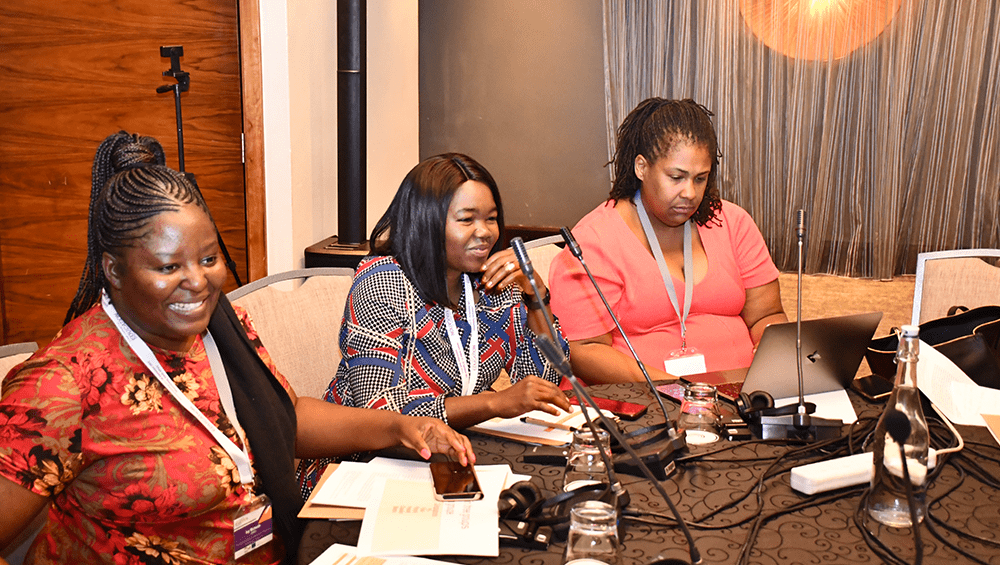Harnessing Education Technology Research Seminar Lessons and Best Practices from Zambia

After convening seven project partners from Burundi, Democratic Republic of Congo, Madagascar, Malawi, Namibia, Rwanda, and Zambia for a two-day seminar on Harnessing Education Technology as a Response to COVID-19 in Johannesburg, South Africa, from 27 to 28 September 2022, GCE shares with you the following reflective lessons from Zambia:
GCE is happy to share with you the following reflective lessons from Zambia.
Lessons and best practices from Zambia
Presented by Ivy Mutwale, Zambia National Education Coalition (ZANEC)
The effects of COVID-19 in Zambia were particularly severe on the most vulnerable, such as those with disabilities. This is because their access to education was utterly compromised due to the prolonged school closure (World Vision Policy Brief, 2020). In its response to curtail the effects of COVID-19, the government of Zambia tried to mitigate the crisis of the school closure by introducing several Alternative Modes of Education Provision (AMEP), which included distance learning, secondary education, and skills training and made Educational Broadcasting Service (EBS) available on radio and television.
The Education for All Campaign, Vision 2030, Millennium Development Goals, and the Sustainable Development Goals underline Zambia’s inclusion policies which aim to increase access, participation, and achievement for all learners, including children with disabilities.
Despite having adopted these and other progressive policy frameworks, the issues listed below were the key factors that affected the success of the adopted e-learning strategies:
- Contents were not adapted to enhance accessibility by children with disabilities;
- Lack of digital infrastructure and a comprehensive policy framework;
- Lack of or limited internet connectivity in basic education facilities (rural vs urban); and
- Lack of or limited knowledge and skills to use ICT among teachers, learners and parents and limited availability of digital content.
ZANEC’s intervention and results
Through the GCE’s Harnessing EduTech Project funded by GIZ, ZANEC undertook a study entitled, “Status of Education Technology and Digital Literacy levels Among Teachers, Learners and Parents in Zambia”. The study assessed and documented the status of education technology and digital literacy among teachers, parents and learners in Zambia.
The study examined the Alternatives Modes of Education Provision (AMEP) used by education providers during the COVID-19 pandemic and identified plausible mitigation measures to ensure learners are all accessing learning without leaving anyone behind.
These included;
- The need to conduct a proper evaluation of the level of digital literacy skills of teachers, learners and parents before policies and mitigation strategies are drafted;
- Development of blended learning technologies that maximize the advantages of both face-to-face and technologically based learning methods to improve overall learning outcomes and the adoption of clear guidelines that assist the progressive adoption of digital learning, especially in areas where learners have little access;
- Upgrading the existing Educational Broadcasting Services (EBS) community radio license to national status, as well as the existing infrastructure and equipment by engaging partners and the private sector to expand coverage and outreach -given that Radio is the most feasible mode of distance learning dissemination in Zambia;
- Developing content suitable for TV broadcasting to be included in the national broadcasting system. Relying on decoders provided by the private sector is a barrier and exclusion mechanism for the needy and disadvantaged;
- Development of all-inclusive digital learning content aligned to the national curriculum in collaboration with education stakeholders. Content should be accessible to children with disabilities, for instance, by incorporating sign language, audios, bigger fonts and braille; and
- Optimising learning platforms and interfaces for mobile phone use given that mobile phones are the most widely used devices by teachers, parents, and learners to access the internet.
As a result of ZENAC’s interventions, there are ongoing engagements with Members of Parliament and regulators on making remote learning available to all learners. Dialogue with service providers on how to make digital learning accessible through reduced costs or zero rating is ongoing. The government, civil society, schools, parents, and partners have partnered to effectively put in place structures to mitigate the effects of the COVID-19 pandemic on the education sector by particularly ensuring that no one is left behind because of COVID-19 broad effects. Bearing in mind various concerns that were raised before and after the Transforming Education Summit (TES), there is a need for Zambia to increase its education budget in line with regional and international best practices, increase its engagement with stakeholders in the education sector, formulate and implement an effective and comprehensive EduTech policy, increase distribution of technological gadgets, enhance its internet infrastructure and capacitate teachers, learners and parents in using ICT and related gadgets.
In Solidarity,
The GCE Secretariat.


